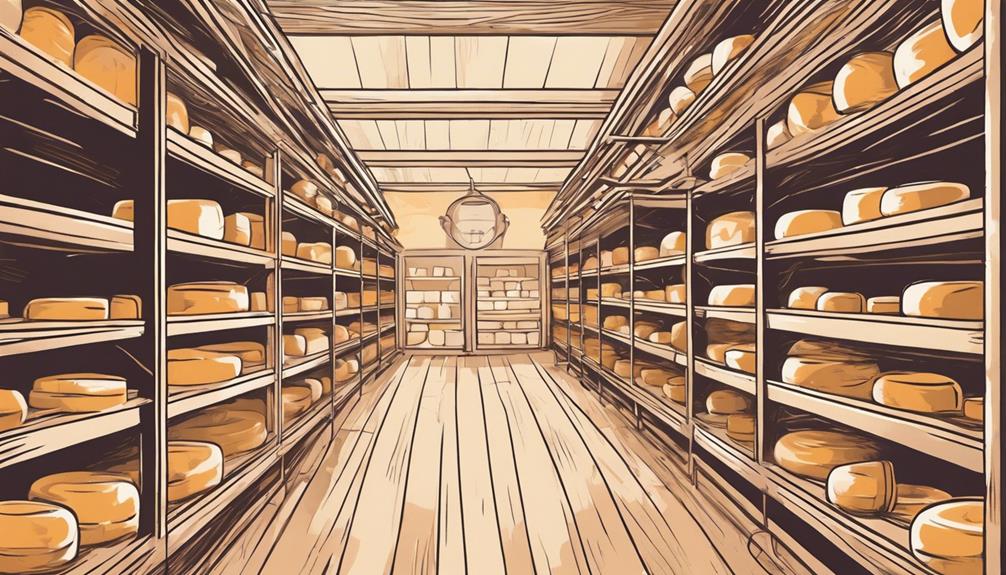How To Become More Self-Sufficient Without Starting a Full-Blown Farm…
Want to start preserving your harvest, making your own soap, or building a backyard root cellar — but not sure where to begin? “Homesteading Advice” gives you instant lifetime access to 35+ practical homesteading books on food preservation, veggie gardening, DIY natural cleaning products (save over $250 per year with this skill alone), brewing, off-grid energy, and a whole lot more…
Click Here To Check It Out Now!
“I’m setting up a small artisanal cheese-making operation in Austin, Texas, and I’m trying to understand how to optimize the aging process. I’ve heard that air circulation plays a crucial role in cheese aging, but I’m not quite clear on the specifics. How exactly does air circulation affect the aging of cheese?” Thanks, Alan, Austin, USA.
Understanding the Impact of Air Circulation on Cheese Aging
Alan, you’re on an exciting journey venturing into the world of artisanal cheese-making! Proper air circulation can make a significant difference in how your cheese matures. Let’s explore why air circulation is so important and how you can effectively manage it in your aging room.
The Role of Air Circulation in Cheese Aging
Cheese aging, or affinage, is an art that requires a delicate balance of several factors, including temperature, humidity, and air circulation. Here’s a closer look at why air circulation is critical:
- Moisture Management: Cheese needs a specific amount of moisture to age properly. Too much moisture can lead to unwanted mold growth, while too little can cause the cheese to dry out and crack. Proper air circulation helps maintain the right moisture levels by preventing condensation and facilitating even evaporation.
- Preventing Mold and Spoilage: Stagnant air can lead to the buildup of harmful molds and bacteria on the cheese surface. Good air circulation helps keep the air in your aging room fresh, reducing the risk of spoilage and ensuring your cheese develops the desired flavors and textures.
- Temperature Regulation: Consistent air flow helps distribute temperature evenly throughout the aging room. This is important because even slight temperature variations can affect the rate at which your cheese ages, leading to inconsistent results.
Optimizing Air Circulation: Practical Tips and Techniques
To ensure your cheese ages perfectly, consider the following tips to optimize air circulation in your aging room:
- Design Your Aging Room Properly: The layout of your aging room can significantly affect air flow. Ensure that there is enough space between cheese wheels or blocks to allow air to circulate freely. Using perforated shelves or racks can also enhance air movement around the cheese.
- Use Fans Carefully: While fans can be helpful in promoting air circulation, they should be used with caution. Direct, strong airflow can dry out the cheese surface too quickly. Position fans to create gentle, indirect circulation that mimics natural air flow.
- Monitor and Adjust Humidity Levels: Air circulation and humidity are closely linked. Use hygrometers to monitor humidity levels and adjust air circulation accordingly. If humidity is too low, consider using humidifiers in conjunction with proper air flow to maintain balance.
- Rotate Cheese Regularly: Regularly rotating your cheese ensures that all surfaces are exposed to the same conditions, promoting even aging. This can help prevent one side from developing differently from the other.
Case Studies: Real-world Examples
To give you a better understanding, here are a couple of real-world examples of how air circulation impacts cheese aging:
- Traditional European Caves: In Europe, many traditional cheese makers age their cheeses in caves. The natural environment of a cave provides an ideal balance of temperature, humidity, and air flow. These conditions are difficult to replicate but serve as a gold standard for cheese aging.
- Modern Aging Rooms: Modern artisanal cheese makers use climate-controlled aging rooms to mimic the conditions found in traditional caves. Through careful management of air circulation, temperature, and humidity, they achieve consistent and high-quality results.
Challenges and Solutions
Managing air circulation comes with its set of challenges. Here are some common issues you might face and how to tackle them:
- Uneven Air Flow: If you notice that some cheeses are aging differently from others, it could be due to uneven air flow. Installing additional fans or adjusting the positioning of existing ones can help distribute air more evenly.
- Humidity Fluctuations: Changes in external weather conditions can affect the humidity levels in your aging room. Using a dehumidifier or humidifier in sync with your air circulation system can help maintain consistent conditions.
- Overcrowding: Overcrowding can restrict air flow, leading to uneven aging. Ensure there is ample space between cheese wheels or blocks and avoid placing too many cheeses in one area.
FAQs on Air Circulation and Cheese Aging
Here are some frequently asked questions to further clarify the role of air circulation:
- How often should I rotate my cheese? Cheese should generally be rotated 2-3 times a week to ensure even aging.
- Can too much air flow be harmful? Yes, excessive air flow can dry out the cheese surface too quickly, leading to undesirable textures and flavors.
- Do different types of cheese require different air circulation? Absolutely. Hard cheeses like Parmesan require lower humidity and more air flow, while soft cheeses like Brie require higher humidity and gentler air circulation.
Alan, these pointers should help you create an ideal environment for aging your cheeses in Austin. As you fine-tune your aging room, you’ll start to see the difference that optimal air circulation can make on the texture, flavor, and overall quality of your cheeses.
Final Thoughts…
Alan, I’m really excited for the delicious cheeses that you’ll be crafting. To sum it up, maintaining proper air circulation in your aging room helps manage moisture, prevent mold growth, and ensure consistent temperature, all crucial for producing high-quality cheese. Thanks for your great question and happy cheese-making!

